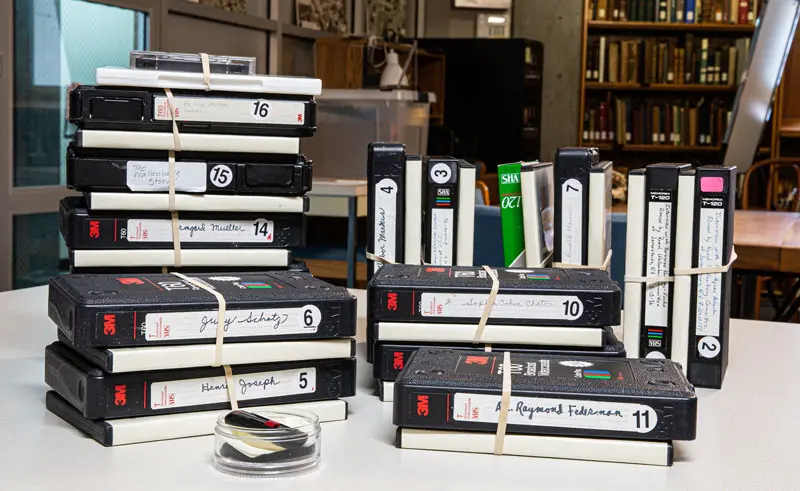

The content of interviews with Holocaust survivors, originally recorded on VHS tapes and audio cassettes, has been digitized and placed on a single thumb drive, placed on the left of the recordings.
Accepted Students ONLY!
Join us Saturday, March 28 (10 AM–2 PM) for Go Big BLUE DAY — sessions, tours, and giveaways.
Sign Up Today!


The content of interviews with Holocaust survivors, originally recorded on VHS tapes and audio cassettes, has been digitized and placed on a single thumb drive, placed on the left of the recordings.
How Holocaust survivors who relocated to western New York recalled their German camp experiences in interviews they gave more than three decades ago have been preserved in a digitalization project undertaken by Special Collections and Archives at SUNY Fredonia.
The oral histories were recorded between 1986 and 1993 by the Raoul Wallenberg Committee of the Jamestown area and the Goldbloom Memorial Fund Committee, from SUNY Fredonia, on VHS tape and audio cassettes that were beginning to approach the end of their life cycles, so it is important to preserve them in a digital format, explained Amanda Shepp, coordinator of Special Collections and Archives in Daniel Reed Library.
Ms. Shepp worked with Norman Carlson of the area Raoul Wallenberg Committee to have the interviews digitized by Richard Roll, of Memorial Photography in Jamestown. They were edited to reduce distracting background noise in order to make them as clean as possible to hear.
“The biggest takeaway I have from this project is learning of the incredible resiliency of people who can really do some incredible things when they are faced with difficult situations.” - Amanda Shepp, coordinator, Special Collections and Archives
The original recordings were compiled by the two Holocaust memorial committees as part of a Living History Project, made when the survivors were mostly in their 70s and 80s, and were donated to Special Collections and Archives in 1994.
What the interviews, which run 30 to 45 minutes in length, reveal are the arrest and internment experiences of the survivors as well as their escape experiences and liberation from concentration or forced-labor camps, located mostly in Germany, near the end of World War II. Some of the men and women interviewed were children at the time, separated from their families, while others, as young adults, were aware of what was going on and the injustices they were experiencing, Shepp explained.
“The biggest takeaway I have from this project is learning of the incredible resiliency of people who can really do some incredible things when they are faced with difficult situations,” Shepp said.
Among those interviewed was Per Anger, a diplomat from Sweden, who worked closely with fellow diplomat Raoul Wallenberg in Budapest before Wallenberg’s disappearance, and described the humanitarian deeds undertaken by Wallenberg to facilitate the escape and relocation of Swedish Jews during the war.
“This is not just local history, but national history, so it’s important for everyone to be able to access these materials,” Shepp said. She is delighted to have Holocaust interviews housed in Western New York at SUNY Fredonia as part of its Local and Regional History Collections, noting that collections of similar historic significance are usually maintained in bigger cities and not in rural areas.
The Raoul Wallenberg Committee, which focused on Holocaust survivors and people who were affiliated in some capacity with Raoul Wallenberg and informing the public of Wallenberg’s heroic actions, and was a chapter of a national organization hoping to shed light on Wallenberg’s disappearance in 1945, while the Goldbloom Memorial Fund Committee, led by Department of History Emeritus Professor George Browder, of SUNY Fredonia, concentrated on those survivors who relocated to western New York. Dr. Browder, a recipient of the SUNY Chancellor’s Award for Excellence in Teaching, was also the 1997 Robert M. Kasling Memorial Lecturer at Fredonia with his address, “The Nazis and Me: An Historian and the Problem of Objectivity.”
The Browder-Wallenberg Collection interviews and available transcripts will become accessible to the public through the library’s Special Collections and Archives website sometime this spring, Shepp said. The digitized recordings have also been accepted when completed by the United States Holocaust Memorial Museum and the Library of Congress.